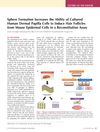Titrated Extract of Centella Asiatica Increases Hair Inductive Property Through Inhibition of STAT Signaling Pathway in Three-Dimensional Spheroid Cultured Human Dermal Papilla Cells
October 2017
in “
Bioscience, Biotechnology, and Biochemistry
”
Titrated Extract of Centella asiatica TECA hair inductive property STAT signaling pathway three-dimensional spheroid culture human dermal papilla cells HDP cells SOCS1 SOCS3 phosphorylated STAT proteins hair growth-related genes Centella asiatica hair growth STAT pathway 3D culture dermal papilla cells SOCS1 gene SOCS3 gene phosphorylated STAT hair growth genes

TLDR Centella asiatica extract may help promote hair growth by blocking a specific cell signaling pathway.
The study from December 2, 2017, demonstrated that Titrated Extract of Centella asiatica (TECA) enhances hair growth properties by increasing cell viability and spheroid size in three-dimensional cultured human dermal papilla cells (HDP cells). TECA was shown to inhibit the STAT signaling pathway, evidenced by decreased activity of STAT reporter genes and reduced expression of STAT-targeted genes SOCS1 and SOCS3. It also upregulated hair growth-related genes and decreased levels of phosphorylated STAT proteins. These findings suggest TECA's potential as a treatment for hair loss by promoting hair inductivity in HDP cells. The study was conducted in vitro, and the number of cells used was not specified in the summary. Further research is needed to understand the exact mechanisms by which TECA affects hair induction. The research was funded by the Korean Health Technology R&D Project, Ministry of Health & Welfare, Republic of Korea.




















